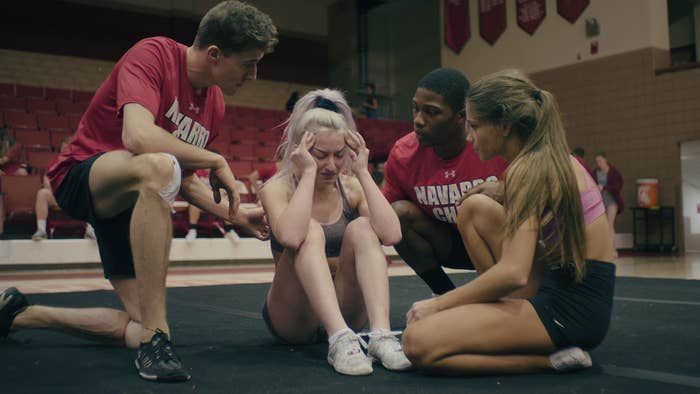
When the first season of the Netflix docuseries Cheer debuted in January 2020, it was a commercial and critical hit. The show, about a group of cheerleaders at Navarro Junior College in Corsicana, Texas, and their coach, Monica Aldama, put the tremendous hard work and athleticism of cheerleaders on full display.
But while the show challenged people’s perceptions of how much effort goes into cheerleading, it also veered into precarious myths of toxic positivity, with its emphasis on young people sacrificing their bodies for the sake of the team. And most jarring of all was the October 2020 arrest of fan-favorite Jerry Harris for alleged sexual assault.
Given this context, it’s surprising that the series’ creator and executive producer, Greg Whiteley, opted to do a second season of the show. “I am a huge believer in the power of stories and telling them honestly,” Whiteley said this past December when it was announced that the show would be returning. “I believe the story is going to ultimately be the best version of itself when you are honoring what is true, and you’re not running from it.” The second season, out today, is evenly split between the Navarro College cheerleaders and their rivals, the underdogs at Trinity Valley College, who reside about 45 minutes down the road in Athens, Texas, and are coached by Javontae Johnson.
While the dramatic stakes are compelling and we see the return of familiar faces — including the self-assured La’Darius Marshall; the tumbler Lexi Brumback, who appears to be enjoying the various income opportunities of fame; and the all-star Gabi Butler — there’s a sense of unease that permeates the season because of the real-life criminal charges against Harris, who appears throughout the first half of the season. Harris, 22, was charged with one count of producing child sexual abuse images and for allegedly soliciting nudes from minors in October 2020; he was hit with subsequent charges just months later. (Harris denied the accusations in a statement to ABC News in September 2020, but when questioned by authorities he allegedly admitted to sexually assaulting a 15-year-old in 2019. He has been held at the Metropolitan Correctional Center in Chicago since his arrest in September 2020 and no trial date has been set.)
One episode halfway through the season, titled “Jerry,” is solely about the allegations and includes on-camera interviews with the victims of his alleged abuse and their mother. Harris’s former teammates frequently express shock, saying they never would have guessed he could commit such crimes.
But given how the show depicts competitive cheerleading, it’s not hard to imagine how this sort of behavior would have flown under the radar. Aldama and her assistant coaches are frequently dismissive of the athletes' feelings. When cheerleaders who train hard for months only to not make mat (qualifying for the team that will perform at finals) are reasonably disappointed, Aldama is quick to shut down their chatter from the sidelines because they’re “being so negative,” as she says in one episode. The culture of toxic positivity, of always needing to put on a brave or smiling face and perfect their routine for the sake of the team, could make athletes feel uncomfortable speaking up about abuse.
In the episode addressing the impact of Harris’s allegations on the lives of his former teammates, a Good Morning America clip plays. Aldama appears on a video call with the other contestants joining her for Season 29 of Dancing With the Stars. Meant to be a surprise, the morning show’s host cuts to Harris, who appears onscreen, hyping his coach up with his high-pitched voice and infectious enthusiasm. “Congratulations, Monica!” Harris screeches. “I’m so, so happy for you. I can’t wait to vote for you every week.” The former cheerleader’s spirited disposition is disarming, and from the many clips shown, this is pretty much the only side we see of him, save for the instances where he discusses his difficult upbringing.
While it might be tough for some to imagine how a person with such a seemingly bright personality could be the source of pain for younger, more impressionable athletes participating in the sport, this dynamic is not uncommon when it comes to abuse. The episode where twin brothers Sam and Charlie tell their story explores how the public perception of Harris almost prevented them from coming forward. “[Harris] messaged me on my private Instagram account on his private Instagram account and like basically just saying, ‘Hey,’ and he asked how old I was,” Charlie says in the episode, recounting an incident that he says occurred during his first cheerleading season in December 2018. “And I told him that I was 13 and then after that, right off the bat, he asked me, ‘Can I have butt pics?’” At the time, Harris was 19.
The episode captures how difficult it can be for sexual assault victims, especially minors, to speak out. Charlie and Sam knew of Harris long before he started messaging them on Snapchat because he was a rising star on one of their favorite cheer teams. They didn’t want to tell their story, at least at first, because it meant they would be ostracized by their peers, people who looked up to Harris. “It made me lose even more faith, I guess, in like just having a safe community in cheer,” Sam said, right after his brother said Harris cornered him in a bathroom during a practice event, demanding sex. Even after being charged with these crimes, Harris still exudes a puzzling optimism. His lawyers, according to Netflix, declined to be interviewed on camera, but Aldama said Harris wrote her a letter saying one day he hoped to become a motivational speaker. If convicted, Harris faces a minimum 15-year prison sentence.
Throughout this season, it feels like Cheer is trying to toe the line between telling hard, uncomfortable truths about the sport of competitive cheerleading while also being inspirational television. In Season 1, you could actively applaud the Navarro team and its dedication to the sport, looking past the injuries the athletes sustained and the broken homes they escaped to make their dreams a reality. But Season 2, which was shot in 2020 and 2021, before and then during the pandemic, it feels icky to witness.
Observing the young cheerleaders push past their breaking point and, even worse, seeing how the coaches poorly handle their emotions when it comes to the athletes’ needs illuminates the overwhelming stress of the sport. “So TT’s out until next Tuesday,” Aldama says in Episode 3’s “Dracut Girl,” referring to a stunter, visibly annoyed by the delays this will cause for the team’s tight practice schedule. “Seems extreme,” she says, right before briefly walking outside of the gym because she needed a “new attitude.” TT’s exact ailment isn’t addressed, but there’s an acknowledgment that he has had “headaches.” That Aldama doesn’t seem sympathetic to his pain is concerning.
Understandably, no one handles their emotions well every single time, and Aldama and the assistants are human like anyone else, but as the season continues, you begin to pick up on several instances where the leaders come across as cold and indifferent to various dilemmas pertaining to the cheerleaders. Even when it comes to the emotional needs of the cheerleaders, it often feels like the coaches don’t think about how their decisions impact players. There’s another scene in that same episode where newcomer Maddy is replaced in a stunt routine without a proper heads-up about the abrupt switch. Moments later, she breaks down crying. “How did I go from being center stunt to not being there at all?” she asks Aldama through tears. “I could’ve gotten, like, a warning before practice.” It doesn’t feel like the cheerleader’s concerns are adequately validated, as everything — even minor expressions of dissent — comes back to the needs of the team. “If we make a decision that I feel is best for the team, I need you to support that, all right?” Aldama says.
While watching Cheer, you will undoubtedly marvel at the incredible stunts the athletes are able to pull off, and you’ll likely tear up when listening to some of the neophytes talk about their journey into the sport, as well as their hopes and dreams for after. But the darker side of cheer makes for tough viewing. As the pandemic continues, some athletes question whether it was worth it to leave their hometowns for the chance to train at Navarro. By the end of the season, some choose not to return. Cheer will likely be a hit for Netflix once again, but this time it’s harder to find anyone to root for. ●
